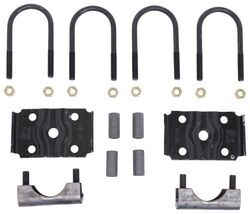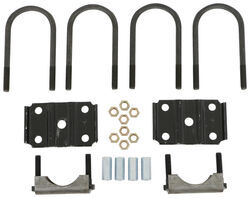
Recommendations for 5th Wheel Trailer That Rides Nose High
Question:
With the hitch adjusted to provide 6 inches of clearance with the truck bed my 5th wheel tows nose high. I dont think it is excessive but what kind of problems should I be watching for?
asked by: Stan
Expert Reply:
If the 5th wheel trailer is riding nose high, the hitch weight will be too low and can lead to ride problems with the towing vehicle, bad trailer sway, and tracking problems with the trailer.
The first thing I would do in your situation is take the truck and trailer to your RV dealer and have them check out your setup. Typically 5th wheel trailers are set up to tow a bit pin high to allow for more weight transfer to the rear most axle or axles on the trailer.
There are a few ways to lower the nose of a trailer besides adjusting the 5th wheel hitch, which you have already done. The pin box can some times be raised up on the trailer by switching to higher installation holes on the frame of the trailer. Be aware that adjusting the trailer too close to the top of the truck bed can result in damage though. You should have about 6 inches of clearance between the truck bed rails and the underside of the trailer loft to account for pitch and roll of the trailer.
Another option is to lift the trailer. You can do this by moving the axles from being above the leaf springs to below the leaf springs.
The diameter of your trailer axle will determine the size of the parts that you will need to order. If your axle is 3 inches diameter, the Dexter Trailer Springs Over-Under Conversion Kit, # K71-385-00, would be a great choice, and if your axle is 2-3/8 inch diameter you could use the Over-Under Kit, # K71-384-00. These kits can be installed without welding but the manufacturer strongly recommends having the new spring seat tacked in place on the other side of the trailer axle.

Products Referenced in This Question
Dexter Trailer Springs Over-Under Conversion Kit
- Trailer Suspension Parts
- Alignment and Lift Kits
- Boat Trailer
- Camper
- Car Hauler
- Snowmobile Trailer
- Utility Trailer
- Double Eye Springs
- Round Axle - 2-3/8 Inch
- Single Axle
- Dexter
more information >
Product Page this Question was Asked From
Dexter Trailer Springs Over-Under Conversion Kit
- Trailer Suspension Parts
- Alignment and Lift Kits
- Boat Trailer
- Camper
- Car Hauler
- Snowmobile Trailer
- Utility Trailer
- Double Eye Springs
- Round Axle - 3 Inch
- Dexter
more information >
Featured Help Information
Instructions

Continue Researching
- Q&A: 5th Wheel Trailer Rides High In Front Even with Hitch Set Low and Pin Box Set High
- Search Results: 28012
- Search Results: turnover ball
- Search Results: gnxa2061
- Search Results: goose ball
- Search Results: x~chock
- Search Results: 3" axle flip kit
- Q&A: What is the Minimum and Maximum Air Pressure for AirLift Air Bag Kit # AL88299
- Q&A: Lowering Height at Front of Fifth Wheel Trailer By Adjusting Pin Box
- Shop: Firestone Ride-Rite Air Helper Springs - Double Convoluted - Rear Axle
- Shop: B&W Ball and Safety Chain Kit for Ford, GM, Chevy, and Nissan Titan XD Underbed Gooseneck Hitch
- Shop: GearSpace 34 Enclosed Cargo Carrier for 2" Hitch - Slide Out - 34 cu ft - 300 lbs - Light Gray
- Shop: Firestone Ride-Rite Air Helper Springs - Double Convoluted - Rear Axle
- Shop: Lippert Venture Lead Leg Repair Kit for 5th Wheel RV Landing Gear
- Article: Best Camper Jacks
- Shop: Draw-Tite Front Mount Trailer Hitch Receiver - Custom Fit - 2"
- Q&A: E6 Error on Furrion Water Heater
- Article: Choosing the Right Suspension Kit for Your Truck and Trailer
- Search Results: rv water heater
- Shop: Dometic RV Water Heater - Gas and Electric - Automatic Pilot - 120 Volt - 10,000 Btu - 6 Gal Tank
- Q&A: Raising the Height of a 5th Wheel Trailer for More Clearance
- Q&A: How Is Dexter Trailer Springs Over-Under Conversion Kit Installed
- Q&A: Options For Lower The Nose Of Your Fifth Wheel Trailer To Ride Level
- Video: Curt Adjustable Width RV Trailer Hitch Installation - 2009 Chevrolet Kodiak
- Shop: Trailer Hitch





